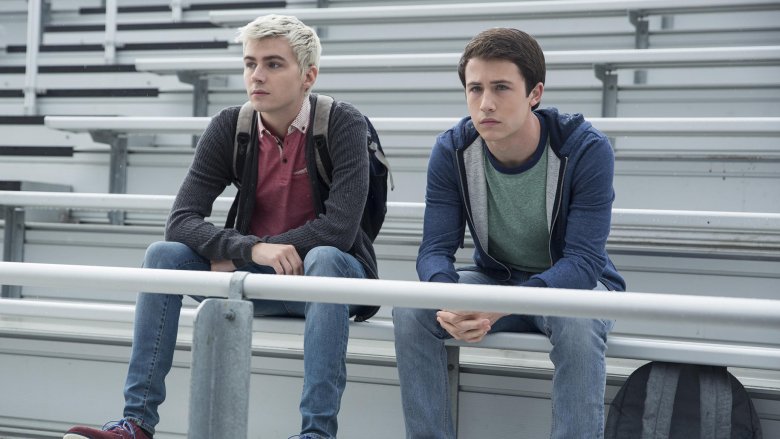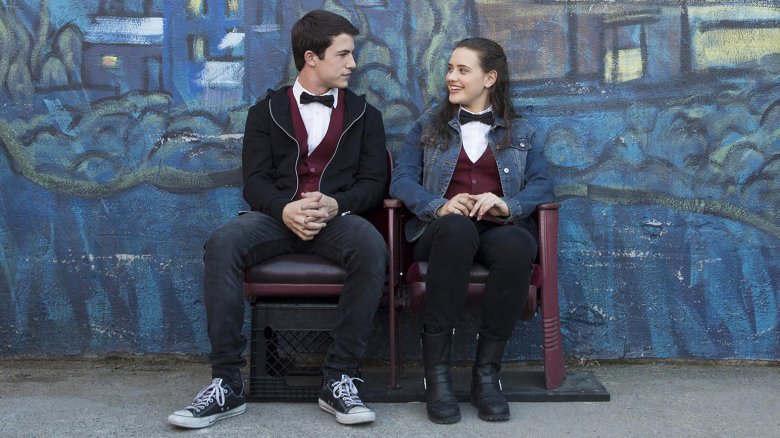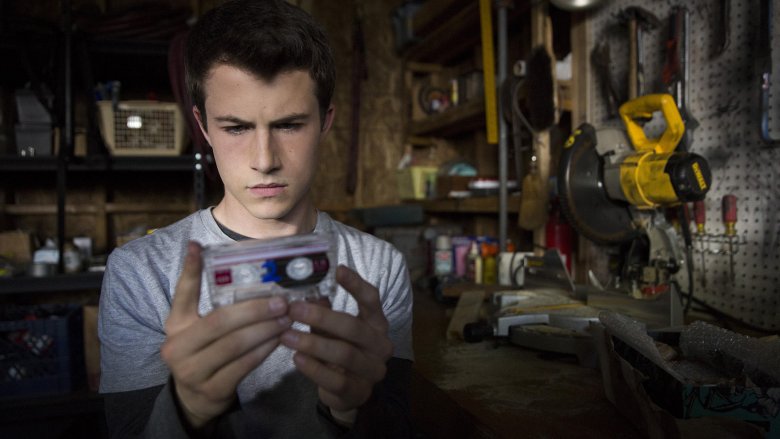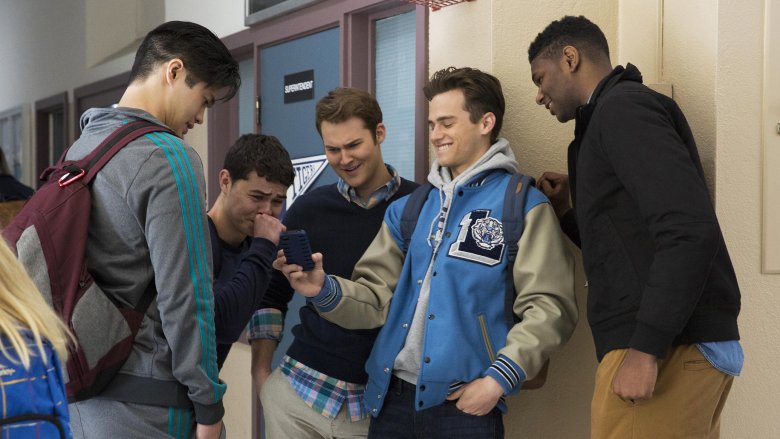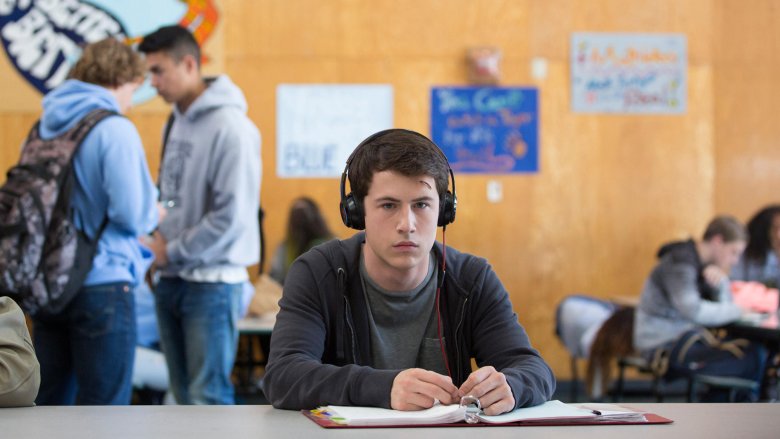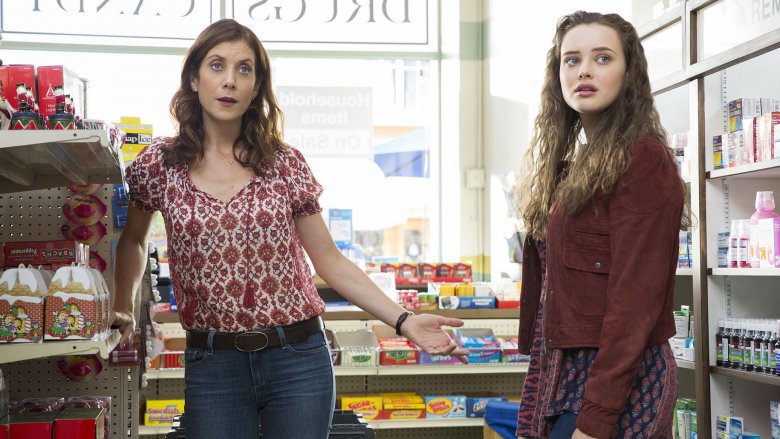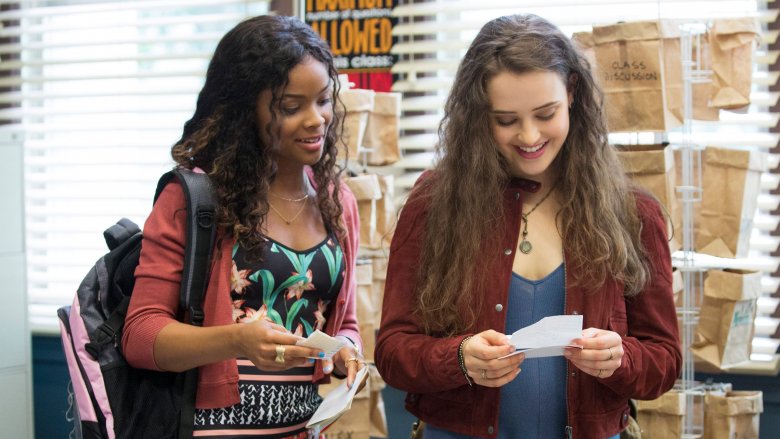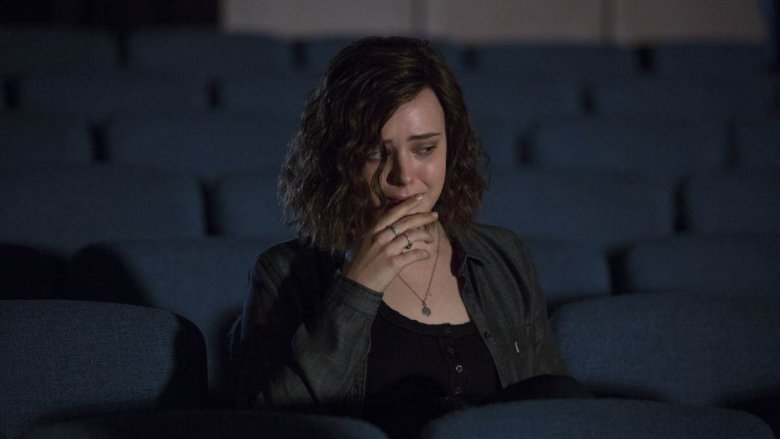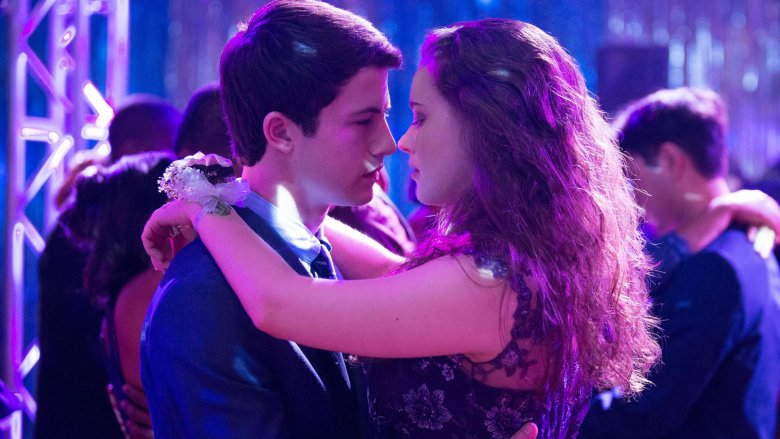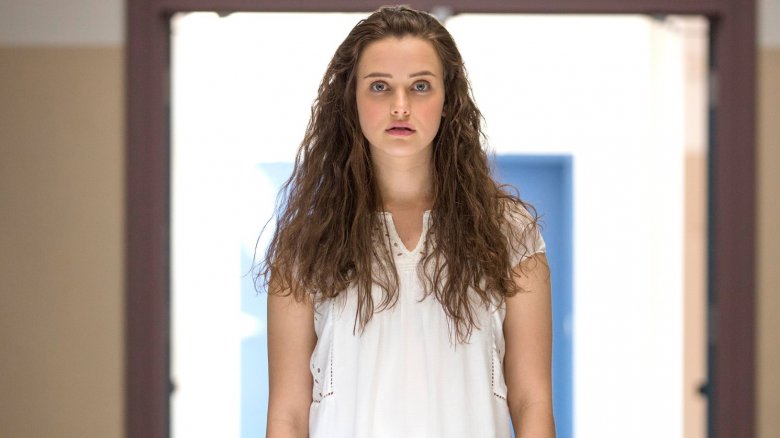Why You Need To Let Your Kid Watch 13 Reasons Why
Since its debut in the spring of 2017, the Netflix original series 13 Reasons Why has been a mega-hit for the streaming video service. Based on the 2007 novel by Jay Asher, the show depicts the aftermath of the suicide of Hannah Baker (Katherine Langford), who leaves behind a series of cassette tapes explaining her reasons for taking her own life.
But with its straightforward approach to sensitive subjects including rape, bullying, and self-harm — and a graphic depiction of Hannah's suicide in the season finale — 13 Reasons Why has been as controversial as it is popular, prompting concerns on the part of school administrators, mental health professionals, and parents about whether it's safe for teens. But if you approach it with consideration and an open mind, the series can be invaluable in teaching young people and their parents how to work through difficult issues. Here are ten arguments in favor of letting your kid watch 13 Reasons Why.
It's a conversation starter
Suicide, bullying, sexual assault, and self-harm: these are incredibly difficult topics to broach with your kids, and many parents avoid them for exactly that reason. But 13 Reasons Why not only handles many of these issues sensitively and authentically, it provides a ready-made framework for talking about them.
As Emily K. Ryzuk, a psychotherapist who specializes in trauma, explained to me in an email, "The great thing about a TV show, is that it contains a beginning, middle, and end, and wraps up in 60 minutes, so it provides the perfect opportunity for parents to broach these difficult topics. Often, kids are exposed to the beginning and middle of a real-life scenario, but never witness the resolution, which leaves kids struggling with the inability to resolve conflicts and deal with difficult real-life issues."
And for parents, she said, just being next to your kid for the duration of an episode puts you in a perfect position to start talking. "A parent can gauge the child's curiosity, or even prior exposure, to similar vignettes," she said. "This experience can open up conversations with children and allow them the opportunity to ask clarifying questions or even self-disclose — giving a rare opportunity for the parent to engage and intervene if necessary.
It helps kids talk to each other, too
13 Reasons Why doesn't just provide a framework for kids and parents to talk about tough topics, it's also helping kids to discuss sensitive issues compassionately, amongst themselves. In an interview with The Cut, one teen described how 13 Reasons Why helped her and her friends overcome the awkwardness and taboo of talking about suicide, saying, "[My] friends and I would sit down and honestly we'd ask each other, 'Have you ever had these feelings before? Have you ever gone through something like this?' It's weird to sit down and have these conversations with your friends, after watching a show that was so powerful."
At a time in their lives when kids often look to their peer group first for feedback and support, 13 Reasons Why has become a valuable point of reference — and it's teaching them to reach out to each other. In that same article, another teen explained, "I feel like what my friends and I really talk about now is Hannah's story, and how each thing really affects her to the point where she made the decision she did. And how we should not just be kind to people — because we should do that every day — but how we should watch what we say to people, and understand that we really don't know people's story and that we shouldn't judge them."
It's too zeitgeist-y to ignore
Even if you could successfully manage to keep a single scene from 13 Reasons Why from ever reaching your child's eyeballs, it would be impossible to shield them from its influence entirely. The show has fully permeated the current American pop cultural consciousness. Within its first week, it became the most tweeted-about series in Netflix history, and it's being watched by so many teenagers that schools are scrambling (sometimes in extremely ill-advised ways) to even keep up with the conversation.
Even if your kid doesn't see 13 Reasons Why, they'll be surrounded everywhere they go by people who have — and who are talking about it, and the issues it raises, in ways you can't control. But if you watch and talk about it with your child, then your voice — and your values — become part of the mix.
It's central to current teen culture
It's a parent's prerogative to set boundaries surrounding their kids' media consumption. And of course, you don't have to let your child see, hear, or read something you virulently disapprove of just because all their friends have access to it. But it's worth noting that when a kid says, "Everyone is watching 13 Reasons Why," they legitimately do mean everyone.
The show has achieved a level of popularity and ubiquity among kids of a certain age, making it a straight-up cultural phenomenon. And while being excluded from one of those is never fun, it can be a special form of social agony, when you're young. While it's not the most important or compelling reason to let 13 Reasons Why air in your living room, it's worth considering that this series is a very big deal to your child's peers — and that kids who don't get to watch the series will feel like (and possibly be treated like) social outliers every time their friends start discussing it.
Forbidding it may backfire
Anyone who's ever watched a forbidden movie at a friend's house (or snuck into their parents' room to page through an off-limits copy of The Joy of Sex) knows that designating a show as too naughty, or too dangerous to watch, can only make it seem more interesting — and make your teen that much more determined to see it, if only to see what all the fuss is about.
But when it comes to 13 Reasons Why, forbidding kids from watching it may also inadvertently teach them to see its sensitive subject matter, especially suicide, as taboo. In an interview with Vanity Fair, writer Nic Sheff — who survived a suicide attempt himself, before joining the show's writing team — spoke eloquently about the need to shy away from discussing it.
"Facing these issues head-on — talking about them, being open about them — will always be our best defense against losing another life," he said. "I'm proud to be a part of a television series that is forcing us to have these conversations, because silence really does equal death. We need to keep talking, keep sharing, and keep showing the realities of what teens in our society are dealing with every day. To do anything else would be not only irresponsible, but dangerous."
If your kid wants to watch it, they'll find a way
We live in a world of pocket-sized supercomputers that come with 24/7 built-in access to streaming entertainment — and a teen who's determined to see a certain wildly-popular Netflix series is going to find a way to access it, allowed or not.
So while making rules about how your kids spend their screen time is a parent's prerogative, it's worth considering the implications when those rules are virtually unenforceable. Refusing to let your kid watch 13 Reasons Why might deter them from seeing it — or it might simply ensure that when they do watch it, they do so without ever telling or talking to you about how it made them feel.
It builds trust on both sides
When you let your kid watch 13 Reasons Why, you're sending an important message: that you trust them to make their own choices and know their own limits when it comes to the media they consume. But when you watch and discuss 13 Reasons Why with your kid, you're sending an even more powerful message: that they can come to you about difficult subjects, and trust you not to freak out or shut down if they need to talk about sex, bullying, or suicide.
Ryzuk told me, "Quite often, parents are unwilling (or unable) to address certain topics and so children look elsewhere for their information — sometimes to incorrect, or, even worse, intentionally deceptive sources. Working in trauma, I often see parents avoiding very difficult topics. While, in the short-term, this avoidance feels more comfortable to both parties, the conversations that inevitably follow are complicated and laced with blame and shame."
Her advice? "Any discussion relating to the show needs to be honest, fact-based, and without fear of retaliation or humiliation."
It's not contagious
If you've been following the conversations, and controversy, surrounding 13 Reasons Why, you may have heard the words "suicidal contagion" — referring to the phenomenon wherein high-profile, highly publicized suicides are often followed by a spate of copycats. Suicidal contagion is real, and can have particularly devastating effects on young people in contained communities like college campuses. But all the available research shows that it only happens in response to real-life incidents — and even then, a variety of complicated factors contribute.
Scientific American sums it up best, saying, "While it is certainly true that over-the-top media representations of suicide of celebrity-type figures will have a copycat effect, it does appear that the public at large are able to distinguish fact from fiction." 13 Reasons Why won't likely leave your child vulnerable to self-harm — and if it upsets him, then you can talk about it.
"Keep an eye on your child and watch for anxiety responses — rapid breathing, fidgeting, leaving the room — and check in with your child," Ryzuk suggested. "Turn it off and engage in open-ended discussions with statements such as 'I noticed that scene made you feel uncomfortable. It made me feel anxious, too. Did something in particular bother you? Do you have any questions that I can help answer?' For a kid who has experienced any of this stuff first hand, this show can be incredibly validating and make him or her feel like they are not alone."
It could deepen your family connection
This is the best case for why you should not only let your kid watch 13 Reasons Why, but you should watch it, too — either with them, or on your own. Teenage fans of the Netflix series have praised it for its authentic portrayal of its high school setting, which Ryzuk explained is key to its popularity and influence.
"Realism, especially when dealing with young adults, is essential," she explained. "Otherwise, they perceive it as 'hokey' or 'cheesy'." Meanwhile, many parents have watched the series and found that it helped them to understand their own kids better. One teen described how her mother was moved to tears by the show, saying, "After she'd finished the last episode, she sent me a text, saying, 'I hope you know you can always come to me, because I will always be there with no judgment.' What she said was really heartfelt and it meant a lot."
It could form healthy habits
For all its benefits as a trust-builder and conversation-starter, 13 Reasons Why can also be a gateway — to reading. Kids who loved the Netflix series are flocking to check out the novel by Jay Asher upon which it was based, and discovering a whole new world of timely, provocative, gorgeously-written young adult fiction in the process.
Watching 13 Reasons Why could inspire your teen to pick up a book — especially if you make reading the novel a condition for letting them check out the show.
It's just good television
There are plenty of shows out there that deal with provocative, sensitive, or sensationalistic subject matter — but there are few that do it to the kind of critical acclaim that 13 Reasons Why has received.
In Forbes' review "13 Reasons Why Is Netflix's Best New Show in Years," critic Paul Tassi called it an "incredibly engaging mystery" and "one of the most impactful things I've seen on Netflix in ages," echoing the feelings of the many viewers whose positive responses to the series have made it a top-rated drama. Yes, the show is a stark depiction of a horrible tragedy. But it's also well-written, well-acted, thoughtful, and authentic, particularly in comparison to so much of the other small-screen fare for young adults.
Watch an episode of 13 Reasons Why, alongside your teen. You might be surprised at what kind of thoughtful conversations it inspires.

